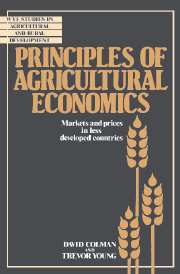Book contents
- Frontmatter
- Contents
- Acknowledgements
- 1 Introduction
- 2 Economics of agricultural production: theoretical foundations
- 3 Product supply and input demand
- 4 Topics in production economics
- 5 Theory of consumer behaviour
- 6 Economics of market demand
- 7 Developments in demand theory
- 8 Equilibrium and exchange
- 9 Analysis of agricultural markets
- 10 Welfare economics
- 11 Economics of trade
- 12 Food and agricultural policy
- Notes
- References
- Index
11 - Economics of trade
Published online by Cambridge University Press: 06 July 2010
- Frontmatter
- Contents
- Acknowledgements
- 1 Introduction
- 2 Economics of agricultural production: theoretical foundations
- 3 Product supply and input demand
- 4 Topics in production economics
- 5 Theory of consumer behaviour
- 6 Economics of market demand
- 7 Developments in demand theory
- 8 Equilibrium and exchange
- 9 Analysis of agricultural markets
- 10 Welfare economics
- 11 Economics of trade
- 12 Food and agricultural policy
- Notes
- References
- Index
Summary
Introduction
No countries are entirely self-sufficient in the supply of goods and services. All of them are engaged in trade, whereby some goods and services are exported abroad and others are imported. That is, there is a situation of international specialisation which mirrors that at the individual level in which (for example) farmers sell food to feed those who produce the fertiliser, machines, insecticide etc. that farmers buy. While much international trade is arranged by the decisions of individuals and firms, the State (particularly in LDCs) may exert considerable control over what is traded and upon what terms. While State interference is frequently criticised by economists (see Section 11.6 below), the fact that it is so widespread reflects the great importance countries attach to the economics of trade. Indeed at the current time there are major trade and economic issues on which LDCs are highly critical of the policies of DCs, and others on which international banks and international bodies such as the International Monetary Fund (IMF) are in turn critical of LDCs.
Stated in rather simplistic terms the IMF and World Bank, reflecting the dominant views emanating from western industrial countries and from a large group of economists, are generally in favour of‘free-trade’; that is in their dealings with LDCs they are generally opposed to measures which protect LDC producers and consumers and which reduce trade. The preference is to leave decisions about resource allocation and the distribution of products to individual market forces.
- Type
- Chapter
- Information
- Principles of Agricultural EconomicsMarkets and Prices in Less Developed Countries, pp. 224 - 263Publisher: Cambridge University PressPrint publication year: 1989



